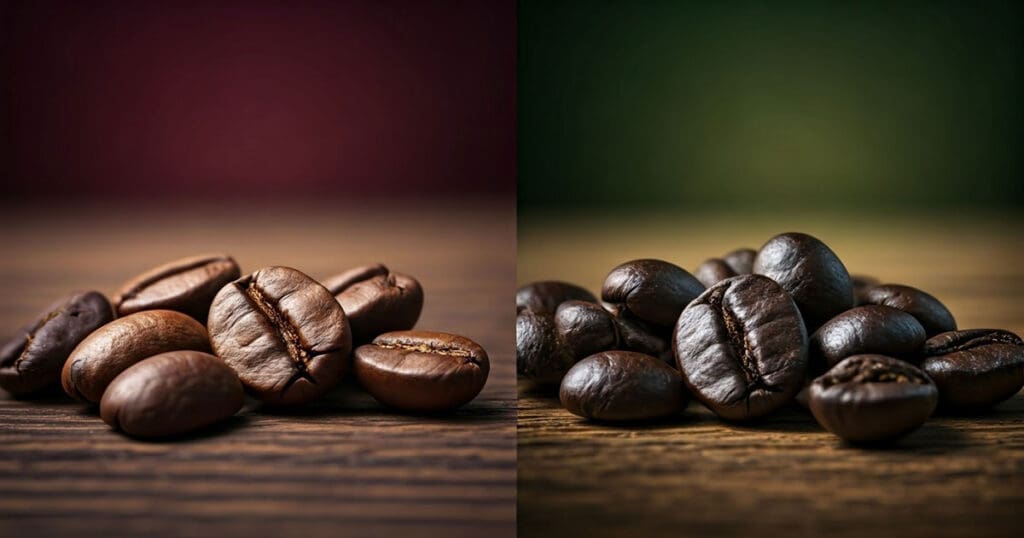Many of us wonder about the differences in coffee beans. We'll look at Arabica vs Robusta Coffee. These two types are popular in the coffee world, each with its own special traits.
They have different tastes and grow in different places. Knowing about Arabica and Robusta Coffee can make our coffee taste better. Let's explore the world of coffee beans together.
Introduction to Coffee Varieties
Exploring coffee varieties is fascinating. Coffee has a long history that started in Ethiopia thousands of years ago. It was first discovered by a goat herder named Kaldi. From there, it spread to Arabia, becoming a social favorite.
As trade routes grew, so did coffee's popularity. It influenced cultures worldwide.
Brief History of Coffee
The story of coffee is truly captivating. Kaldi, a goat herder, first found coffee. In Yemen, people turned its beans into a drink.
By the 15th century, coffeehouses, or qahveh khaneh, emerged in the Middle East. They were key to community life. When coffee reached Europe in the 17th century, it changed again.
People started to enjoy different coffee types. This led to the opening of cafés. These places became hubs for conversation and debate.
Importance of Coffee in Culture
Coffee is more than just a drink. It's a key part of many cultures. In Ethiopia, coffee ceremonies are elaborate. In Italy, late-night espresso bars are common.
Coffee brings people together. Sharing a cup of coffee shows friendship and community. Understanding coffee's history helps us see its role in society.
What is Arabica Coffee?
Arabica coffee is a favorite worldwide for its unique taste and special qualities. We'll look into its main traits, the best places to grow it, and its delicious flavor.
Key Characteristics
Arabica coffee has less caffeine than Robusta and more acidity. This makes it smoother and more complex. Its beans are oval and taste sweet and delicate. Many coffee lovers enjoy its depth and subtlety.
Preferred Growing Conditions
Arabica coffee grows best at high altitudes, between 2,000 and 6,000 feet. It needs cooler temperatures and steady rain. Places like Colombia and Ethiopia are perfect for growing it because of their climate and soil.
Flavor Profile
The flavor of Arabica coffee is loved for its sweetness and complexity. It often tastes fruity, floral, and has a smooth finish. Every cup of Arabica coffee is a special treat, showing off the place it comes from. It's a favorite among coffee connoisseurs everywhere.
What is Robusta Coffee?
Robusta coffee is different from Arabica. It has unique qualities that make it special. Knowing its characteristics, growing conditions, and flavor helps us appreciate it more.
Key Characteristics
Robusta characteristics include a higher caffeine content. This makes it stronger and more bitter. It's perfect for those who want a bold coffee. Robusta plants also grow well in tough conditions, unlike Arabica.
Preferred Growing Conditions
Growing conditions for Robusta are unique. It grows best at lower altitudes, between 600 to 1,200 meters. It prefers hot temperatures and lots of rain. Vietnam and Brazil are big producers because of their good climates.
Flavor Profile
The Robusta flavor profile is earthy and nutty. It's great for espresso because it adds texture and crema. Coffee lovers say it's richer and more intense, perfect for those who like strong coffee.
Growing Regions for Arabica and Robusta
Exploring coffee growing regions shows us the variety in our favorite drinks. Each type of coffee grows best in certain climates and heights. This is what makes our coffee so unique.
Major Arabica-Producing Countries
Arabica coffee loves cooler weather and grows at higher elevations. Some top countries for Arabica are:
- Colombia: Its rich soil and perfect temperatures make Colombia a top Arabica producer.
- Ethiopia: Known as coffee's birthplace, Ethiopia's varied climates add to its unique tastes.
- Honduras: With good weather and a focus on quality, Honduras is becoming a major Arabica player.
Major Robusta-Producing Countries
Robusta coffee thrives in warmer, more humid places. The top Robusta producers are:
- Vietnam: Vietnam leads in Robusta exports, thanks to its ideal growing conditions.
- Brazil: Brazil grows both Arabica and Robusta, with a big focus on Robusta because of its climate.
- Indonesia: Indonesia's diverse islands are perfect for growing rich Robusta coffee, found in many unique places.
These regions not only shape the coffee we love but also connect us through the global coffee culture.
Caffeine Content: Arabica vs Robusta
Knowing the caffeine in Arabica and Robusta coffee beans is key for coffee lovers. The caffeine levels in these two types affect their taste and experience. Robusta usually has almost double the caffeine of Arabica beans.
Comparison of Caffeine Levels
Arabica coffee has 1.2% to 1.5% caffeine. Robusta has 2.2% to 2.7% caffeine. This big difference changes the coffee's strength and taste.
Impact on Flavor and Aroma
Robusta's more caffeine makes it stronger and sometimes bitter. It's great for those who want a bold coffee. Arabica, with less caffeine, has a more delicate flavor and aroma. This is why some people prefer Arabica's subtleties.
Taste Differences Between Arabica and Robusta
Exploring the taste differences between Arabica and Robusta coffee helps us enjoy each type's unique flavors. By looking at the specific flavors of both, we can make better coffee choices. This is based on what we like best.
Flavor Descriptors for Arabica
Arabica coffee is known for its complex taste. It has several key notes that make it special:
- Berries - A fruity sweetness that brightens the taste.
- Chocolate - Rich, smooth chocolate undertones add to the experience.
- Nuanced Acidity - A pleasant, tangy acidity adds depth and vibrancy.
These Arabica taste differences make a delightful cup that many coffee lovers enjoy.
Flavor Descriptors for Robusta
Robusta coffee has a more robust flavor profile. Its character is defined by:
- Bitterness - A pronounced bitterness that stands out in the taste.
- Woody Notes - Earthy, woody flavors make it distinct.
- Full-bodied - The heavier body of Robusta creates a more intense mouthfeel.
Knowing these Robusta taste differences helps us appreciate its unique qualities. It shows how it can complement different brewing methods.
Pricing Differences in Coffee Beans
It's important to know why Arabica and Robusta coffee beans cost differently. Many factors play a role in their prices. This creates unique market dynamics.
Factors Affecting Cost
Several things can change coffee prices. Key factors include:
- Production Methods: Arabica needs more care, which raises its cost.
- Rarity: Arabica is rarer than Robusta, making it pricier.
- Market Demand: People who love coffee prefer Arabica for its taste, so it costs more.
- Geopolitical Events: Weather, politics, and trade deals can also affect prices.
Market Trends for Both Varieties
Prices for Arabica and Robusta coffee beans are changing. Arabica is getting more popular in fancy coffee shops, which makes it more expensive. On the other hand, Robusta is still used for cheaper blends and instant coffee. Knowing these trends helps us understand price changes and availability better.
Roasting Profiles for Arabica and Robusta
Exploring coffee roasting profiles, we find Arabica and Robusta have unique qualities. The roasting techniques we use greatly affect the coffee's flavor and aroma. This section looks at the best roasting methods for each type and how they impact taste.
Ideal Roasting Techniques
Arabica coffee does well with lighter roasts, which keep its complex flavors intact. Medium to light roasts bring out Arabica's floral and fruity notes. On the other hand, Robusta coffee is best with darker roasts, which highlight its bold taste. These roasts bring out Robusta's earthy flavors.
Effects of Roasting on Flavor
Roasting changes how we experience sweetness, acidity, and body in coffee. For Arabica, choosing the right roast time and temperature keeps the coffee bright and complex. Robusta, with deeper roasts, becomes bolder and more full-bodied, appealing to those who like a stronger taste. Knowing these differences helps us find the perfect roast for our taste.
Health Benefits of Arabica and Robusta Coffee
Exploring coffee's health benefits is key to our appreciation. Arabica and Robusta coffee have special nutritional values that can add to our daily lives. It's important to know their benefits and possible downsides.
Nutritional Aspects of Both Varieties
Arabica coffee is known for its antioxidants. These compounds boost flavor and health. It's rich in B vitamins, potassium, and magnesium, which help with energy and heart health.
Robusta coffee, with more caffeine, can make us more alert and focused. Yet, we must watch out for its potential risks, like heart problems and anxiety.
Potential Health Risks
While coffee has many benefits, we must also consider the risks, mainly with Robusta. Its high caffeine can cause anxiety and health issues for some. Always think about your body's limits and health history when picking coffee.
Knowing the differences between Arabica and Robusta helps us choose wisely for our health. Let's enjoy our coffee, but remember to do so in moderation.
Conclusion: Choosing the Right Coffee for You
As we finish our look at Arabica and Robusta coffees, it's key to know what to look for. The choice between these two should be based on what we like in flavor and smell. Arabica's complex sweetness or Robusta's bold taste can really change our coffee experience.
Caffeine content matters too. Arabica has less caffeine but tastes smoother. Robusta, on the other hand, has more caffeine and a bolder taste. This can be a big factor for some.
Price is also important. Arabica beans cost more because they're harder to grow. Knowing our budget helps us choose wisely. We should also think about the health benefits of each type.
Choosing coffee is a personal thing. Knowing the differences between Arabica and Robusta helps us pick the best coffee for us. With this knowledge, we can enjoy every cup and find our perfect coffee.
Disclaimer:
Some of the links on this site are affiliate links, which means I may earn a small commission if you make a purchase through them, at no additional cost to you. Thank you for supporting Brew Sip Repeat!




Facebook Comments